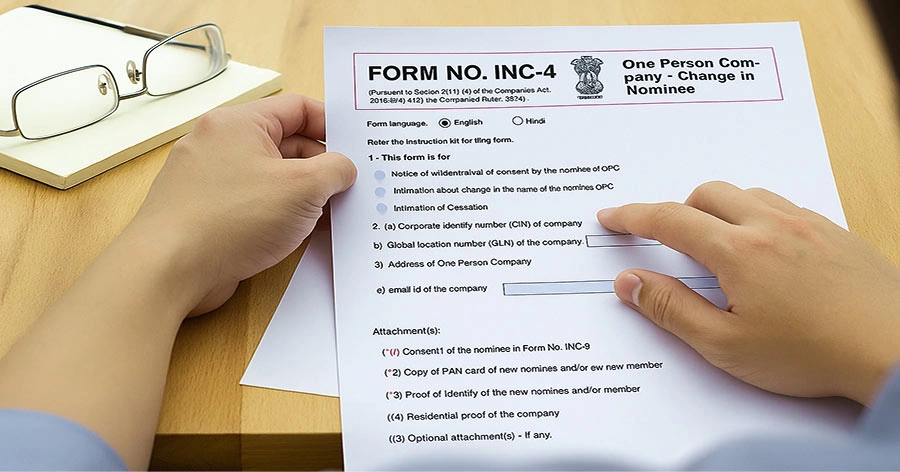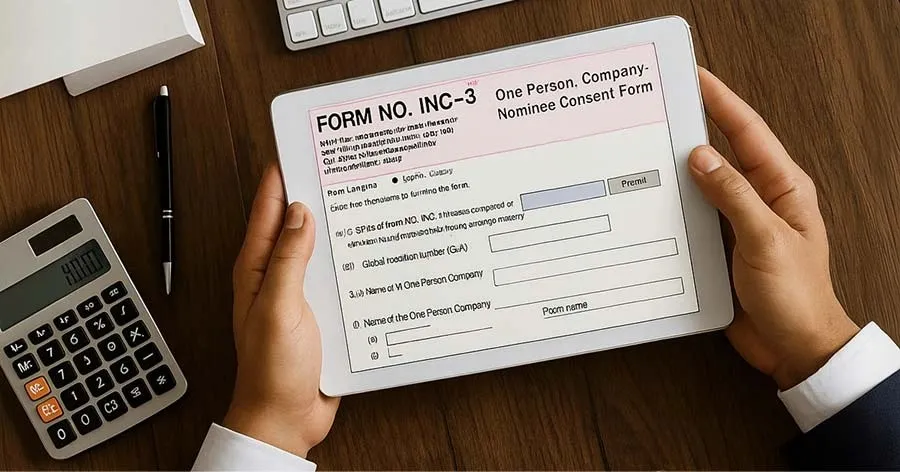
Introduction
Are you a solo entrepreneur eager to launch your venture as a one person company in India?
In this in-depth guide, we explain how a one person company in India can empower you with limited liability, corporate benefits, and a hassle-free registration process.
Discover real OPC examples in India, learn about the one person company registration cost in India, and find out exactly how to start one person company in India with expert assistance from RegisterKaro. Let’s dive into the world of one person company formation and explore why our approach makes all the difference.
What Is a One Person Company in India?
A single entrepreneur can incorporate a company as a One Person Company in India, a business structure introduced under the Companies Act, 2013. This model blends the simplicity of a sole proprietorship with the advantages of limited liability and perpetual succession.
Additionally In a OPC, the owner can act as both the sole shareholder and director, enjoying a legally separate identity from personal assets.
Key Legal Features
- Separate Legal Entity: Indian law recognizes a One Person Company as an independent corporate body. This shields the owner’s personal assets from business liabilities, as established in landmark cases like Salomon v. Salomon.
- Limited Liability: The company limits the owner’s liability to the amount of capital invested, protecting personal wealth.
- Nominee Appointment: During registration, the owner must appoint a nominee to ensure business continuity if the owner becomes unavailable.
- Fewer Compliance Requirements: A One Person Company complies with simpler annual filing and reporting rules compared to traditional private companies.
- Regulatory Framework: The Companies Act, 2013 governs One Person Companies in India. For full legal details, you can visit the Ministry of Corporate Affairs.
Benefits of Forming a One Person Company in India
The OPC structure in India offers a multitude of benefits, making it an ideal choice for solo entrepreneurs. Here’s why you should consider this model:
1. Complete Control and Flexibility
As the sole owner of your one person company in India, you have total decision-making authority. This complete control enables swift business decisions, helping you pivot quickly in a competitive market. Entrepreneurs who choose to start one person company formation in India enjoy the freedom to innovate without the constraints of multiple shareholders.
2. Protection Through Limited Liability
One of the most compelling benefits of a OPC in India is the protection it offers. Your assets are safeguarded against the company’s debts and liabilities. With limited liability, your financial risk is confined only to the capital you invest—a major advantage over sole proprietorships.
3. Enhanced Credibility
Registering a OPC in India elevates your business’s credibility in the eyes of banks, investors, and partners. This formal structure paves the way for easier access to loans, grants, and other funding opportunities. Moreover, as you learn how to start OPC in India with RegisterKaro, you can build a strong brand reputation from the outset.
4. Simplified Compliance and Lower Costs
The compliance requirements for a OPC in India are significantly lower compared to those for a private limited company. There is no need to hold annual general meetings, and the filing process is streamlined. This simplicity directly impacts the one person company registration cost in India, making it a cost-effective solution for budding entrepreneurs.
5. Seamless Transition and Perpetual Succession
Even if the sole owner passes away or is incapacitated, the business continues through the nominee, ensuring perpetual succession. This assurance allows you to focus on growth without worrying about the continuity of your venture.
The robust advantages of a OPC in India make it a smart choice for any individual looking to combine entrepreneurial freedom with the stability of a formal corporate structure.

Comparative Analysis: OPC Laws in India vs. Other Jurisdictions
While the OPC in India model has many advantages, it’s interesting to compare it with similar structures in other countries:
United Kingdom
In the UK, a similar model exists as a Single Member Company (SMC). However, UK law does not impose a nominee requirement, and the minimum capital requirement is often flexible. The landmark case Salomon v. Salomon in the UK set the foundation for corporate personhood, which has influenced the one person company in India.
Singapore
Singapore offers a streamlined process for incorporation with minimal capital requirements and efficient government services. Their approach to one person company registration focuses on ease of doing business, similar to our goal at RegisterKaro.
Comparison summary
- Regulatory Framework: The Companies Act, of 2013, has clear provisions such as nominee appointment and mandatory compliance norms. By contrast, jurisdictions like the UK and Singapore offer more flexibility in certain areas.
- Cost Implications: The registration costs in India are transparent and based on fixed government fees, while other countries may offer lower costs due to fewer procedural requirements.
- Legal Protections: All jurisdictions ensure limited liability, but the one person company uniquely combines the corporate benefits of a private limited company with the ease of a sole proprietorship.
These differences highlight the robustness of the one person company model, which is specifically designed to boost entrepreneurship in the Indian market.
How to Start a One Person Company in India
If you’re wondering how to start one person company in India, follow these simple steps. RegisterKaro is here to guide you every step of the way:
Step-by-Step Registration Process
- Obtain a Digital Signature Certificate (DSC): Apply for a DSC, which is mandatory for digital filing on the MCA portal.
- Get a Director Identification Number (DIN): Apply for a DIN through the MCA website.
- Name Reservation: Select and reserve a unique company name. Ensure your name reflects the business and includes “(OPC) Private Limited” to denote its status. Use the RUN (Reserve Unique Name) service on the MCA portal for a hassle-free reservation.
- Preparation and Filing of Incorporation Documents: Prepare the Memorandum of Association (MOA) and Articles of Association (AOA). File these documents along with the SPICe+ form (Simplified Proforma for Incorporating Company Electronically).
- Pay the Registration Fees: Registration fees vary based on the authorized capital of your one person company in India.
- Issue of Certificate of Incorporation: Upon successful verification, the Registrar of Companies (RoC) will issue a Certificate of Incorporation.
For a more detailed guide on How to Register a One Person Company (OPC) in India: Step-by-Step Guide click for this blog.
One Person Company Registration Cost:
Understanding the one person company registration cost in India is crucial before starting your venture. The cost depends on several factors:
- Authorized Capital: There is a minimum paid-up capital requirement that influences the stamp duty and registration fees.
- Professional Fees: At RegisterKaro, we offer competitive pricing to keep these expenses low.
- Government Fees and Stamp Duty: These are fixed fees based on the authorized capital and are payable at the time of registration.
Overall, our streamlined process at RegisterKaro ensures that the one person company registration cost in India remains transparent, affordable, and competitive, enabling you to focus on growing your business without financial surprises.
One Person Company Example in India
Numerous inspiring one person company example in India showcase the potential of this business model. Here are a few notable cases:
- MyOnlineC: MyOnlineCA started as a one person company founded by an individual who wanted to simplify legal and compliance services. Today, MyOnlineCA has expanded its services nationwide, helping thousands of entrepreneurs register their businesses with ease. This example proves that a one person company can scale rapidly with the right support.
- Truffle House OPC Pvt. Ltd.: Truffle House OPC Pvt. Ltd. is another exemplary one person company that began as a solo venture. By leveraging technology and innovative business practices, it grew from a small setup into a recognized brand in the culinary market. This real case exemplifies how a company can thrive and eventually evolve into a larger enterprise.
- Akhan Dairy OPC Pvt. Ltd.:Akhan Dairy OPC Pvt. Ltd. illustrates the success in the agro-food sector. The company, started by a passionate entrepreneur, rapidly expanded its operations while maintaining full control over decision-making. This example is often cited as one of the best one person company examples in India for its rapid growth and efficient management.
This example of One Person company in India highlight the potential of one person company formation in India to launch successful, scalable businesses even in competitive markets.
Ready to launch your venture? Contact RegisterKaro today for expert assistance in one person company formation in India and transform your entrepreneurial dream into reality!
Frequently Asked Questions
A one person company in India is a type of business entity that allows a single individual to incorporate a company with limited liability and a separate legal identity. It is governed by the Companies Act, 2013.




